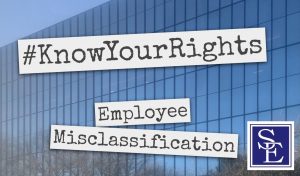Last week, in the case of East Bay Drywall, LLC v. Department of Labor and Workforce Development, the State Supreme Court upheld a determination by the Commissioner of the Department of Labor and Workforce Development (DOL) that a drywall company had been misclassifying employees as independent contractors for several years, and as a result, now owes tens of thousands of dollars in unpaid unemployment and temporary disability contributions. The Court analyzed New Jersey’s Unemployment Compensation Law, N.J.S.A. 43:21-19(i)(6)(A)-(C), colloquially known as the “ABC test” to determine whether the workers were properly classified as employees or independent contractors.
East Bay Drywall is an installation business that bids for projects and then hires subcontractors to complete those projects. Each subcontractor is hired on a per job basis and can bring on as many workers as necessary to complete the job. East Bay Drywall provides the raw materials for the work and the workers bring their own tools and perform the labor. Ultimately, East Bay is responsible for the completed project.
Up until June 30, 2013, East Bay had been reporting employee wages to the DOL. In 2016, an audit was commenced to review the company’s classification of workers it hired between 2013 and 2016, when it was no longer reporting wages. The DOL’s auditor found that four individuals and twelve business entities that had worked for East Bay during that time were improperly classified as independent contractors, and informed East Bay that it owed $42,120.79 in unpaid unemployment and short-term disability contributions. East Bay contested the audit in New Jersey’s Office of Administrative Law, where a judge concluded that only three workers had been misclassified and the other thirteen were in fact independent contractors. However, the final decision still rested with the DOL Commissioner, who ultimately upheld the findings of the audit. The Commissioner found that all sixteen workers at issue were East Bay employees under the ABC test. The company appealed, and the Appellate Division affirmed the Commissioner’s determination as to only five of the workers, finding that the other eleven were independent contractors. The Supreme Court granted certification.
 New Jersey Employment Lawyers Blog
New Jersey Employment Lawyers Blog


